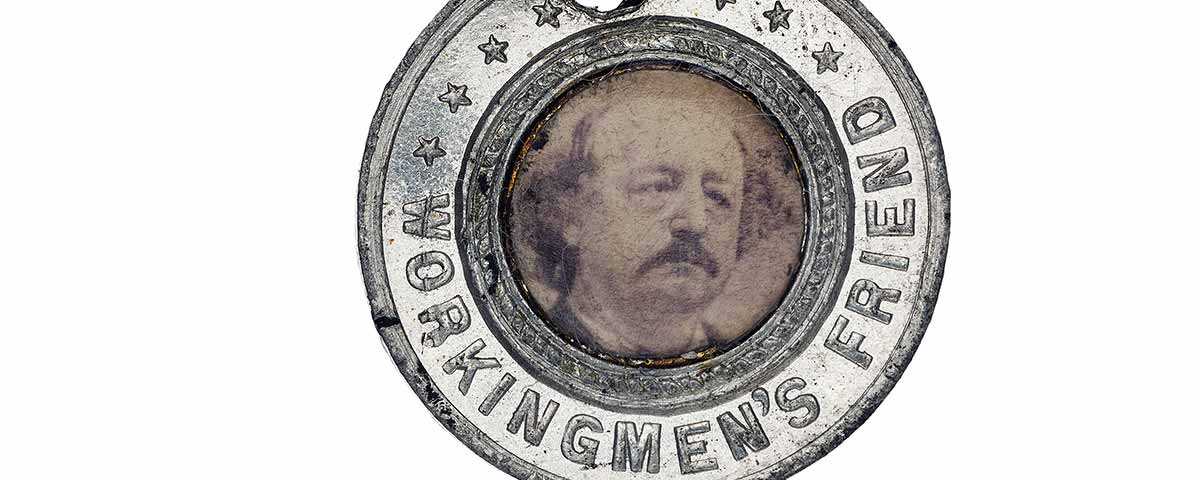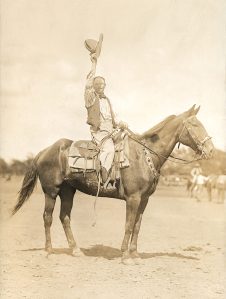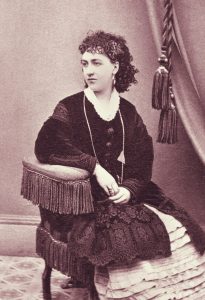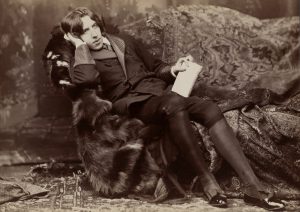For an eight-month period in 1862 Major General Benjamin Franklin Butler, the Union military governor of New Orleans, was probably the most reviled man in the South. He quickly became known as “Beast” and “Spoons”—and undoubtedly countless other sobriquets not usually heard in genteel Southern drawing rooms. But were the epithets fair? Was Butler’s reign as the Crescent City’s de facto dictator really as infamous as history has led us to believe?
[dropcap]T[/dropcap]hough a successful Massachusetts attorney and staunch Unionist, Butler was no abolitionist. He inherited no family wealth, and believed all secessionists—particularly wealthy ones—were traitors and should be treated as such. Sympathetic to the plight of textile workers, most of them women, he campaigned unsuccessfully for them to get decent working conditions and a living wage. But ever the chameleon, he then made a fortune investing in a mill, exploiting the type of workers he had tried to help. When war came, his status as a Democrat. from an important Northern state with powerful political connections led the Lincoln administration to overlook his constant political intriguing and incessant clamoring for a field command.

Butler’s first “action” occurred at the war’s outset on April 20, 1861, when he was assigned with keeping Washington, D.C., in Union hands. The Northern capital was surrounded by secessionist Virginia and Confederate-leaning sections of Maryland, whose governor refused to allow Federal troops to travel by rail through Baltimore. Butler, however, made a crafty end run by landing the 8th Massachusetts Infantry in Annapolis, Md., an approach from the east that sidestepped hostile locals. By April 27, Butler had restored severed rail service between Washington and Baltimore and threatened Maryland legislators with arrest if they voted for secession. His actions earned him widespread approval in the North and praise from Winfield Scott, the Army’s aging general-in-chief.
The praise was short-lived, though. Butler’s successful but heavy-handed occupation of Baltimore was accomplished in contravention of Scott’s Anaconda Plan, which hinged on maintaining good political relations with slave-holding border states, hoping that would help induce them to stay in the Union. But Butler’s political wiles saved him from further censure and he was soon promoted to major general of volunteers and sent to Fort Monroe, Va., at the mouth of the James River near Norfolk. It was there that he famously declined to return three runaway slaves who had come into his lines to their owner, declaring them contraband of war. The term “contraband” became synonymous for any runaway slave seeking refuge with the Union Army.
Then, after Butler stirred up a hornets’ nest in his home state by battling Governor John A. Andrew over authority to appoint regimental officers, President Abraham Lincoln decided to send Butler to the new Department of the Gulf, as far from Washington as possible. The president saw the bellicose general as the ideal candidate for administering New Orleans, which in April–May 1862 succumbed in the face of a Union armada under Flag Officer David Glasgow Farragut. New Orleans was not only the first major Confederate city to fall in the yearlong war, it was also the South’s largest, most diverse metropolis.
Butler’s abrasive personality and harsh tactics in trying to maintain order earned immediate spite from the locals, some of it deserved. The general entered the city with great pomp on May 1 and established his headquarters at the fashionable St. Charles Hotel. Having no illusions that he would preside over a docile and cooperative citizenry, he immediately placed the city under martial law, confiding in a letter to Secretary of War Edwin M. Stanton that there existed “a violent, strong, and unruly mob that can only be kept under by fear.” An aggressive occupation policy backed by Union bayonets obviously would be needed to maintain order and control the obstructionist civil authority.

Unfortunately this causes most observers to overlook the skill Butler displayed as the city’s civic administrator. In reality, when Butler wasn’t provoking Southern womanhood or reportedly appropriating other people’s silverware (thus, the “Spoons” sobriquet), he made New Orleans a safer and healthier city than it had ever been before.
From the beginning Mayor John T. Monroe made it clear that he and the city council would not cooperate with Union authorities, even though the general seemed prepared to govern the city under dual authority. In fact, Butler’s first official proclamation seemed to offer both a firm, but also fair, administration. He claimed his only desire was “to preserve order and maintain the laws” and urged citizens “to pursue their usual avocations.” Within a month, however, Butler had ordered the mayor arrested and the city council disbanded.
To better keep the peace, Butler bivouacked only 2,800 of his 18,000 troops in the city. Churches and shops could reopen; even saloonkeepers could ply their trade after obtaining licenses from the occupation authorities and taking the oath of allegiance to the United States. Steadfast secessionist Julia Le Grande confided to her journal on May 9, “I think their plan is to conciliate if possible” and the New Orleans Commercial Bulletin commented that while some of the provisions of the proclamation “were exceedingly stringent,” others were “as fair and liberal as could be expected.”
Even with a fully functioning city administration, prewar New Orleans had a reputation for violence, lawlessness, and civic corruption. Butler requested that citizens report soldiers who “committed any outrage upon any person or property.” He backed up his words with action when he hanged two of his soldiers for stealing from private homes and sentenced another to hard labor. The police force was rife with political corruption; Butler replaced officers who owed their jobs to the former city government with men willing to take the oath of allegiance. Men of the 31st Massachusetts Infantry were ordered to carry out provost marshal duties, enforce Butler’s regulations, and impose harsh penalties on lawbreakers and openly disloyal residents.
[quote style=”boxed” float=”left”]Butler immediately placed the city under martial law, saying that there existed ‘a violent, strong, and unruly mob that can only be kept under by fear’[/quote]
Only a month after he took over, the New Orleans Picayune admitted that the city had never before been “so free from burglars and cutthroats.”
Besides keeping the peace, Butler had to feed a starving city. Foodstuffs had been scarce in New Orleans since the war began. In August 1861, a crowd of angry women invaded City Hall demanding food at more reasonable prices. With the Mississippi River closed to trade and the Union blockade tightening, a serious situation became critical. Flour sold for $50 a barrel when it could be had. While local profiteers made sure that goods were available to the wealthy, even basic necessities remained beyond the means of working people and the poor. On May 8, Butler wrote to Secretary of War Stanton: “My action in regard to provisions was made absolutely necessary by the starvation which was falling upon ‘the just and the unjust,’ and as the class of working-men and mechanics, on whom it is pressing most heavily…”
Butler issued orders on May 3 granting safe passage to a steamboat bound to New Orleans from Mobile, Ala., with a hold full of flour. He opened the Opelousas Railroad and ordered its owners to run trains that brought livestock, flour, and other provisions from southern Louisiana and the Red River region. In June the provost guards seized a warehouse containing a thousand barrels of beef originally destined for nearby Confederate forces. Butler distributed the beef “among the deserving poor of this city from whom the rebels had plundered it…” casting the relief effort as a battle between the city’s secessionist elites and the starving common people.
When supply ships from New York began to ameliorate the worst of the food crisis, Butler ordered his commissary officers to sell army food to hungry civilians at fixed low prices: 10 cents a pound for beef, ham, pork, and bacon; 7½ cents a pound for flour. He proudly reported employing 1,000 impoverished laborers to distribute food to more than 9,700 families. By October the U.S. Relief Commission reported it was feeding 32,150 people.
[quote style=”boxed” float=”left”]Only two cases of yellow fever were reported during butler’s tenure in New Orleans[/quote]
New Orleans was built on commerce and Butler realized that lifting the blockade and opening the port would do much to relieve the destitution and idleness that plagued the city’s residents. On May 10 he alerted Stanton “to the subject of opening the Port of New Orleans. No measure could tend more to change the entire feelings and relations of the people here than this.” Lincoln agreed and officially lifted the blockade on June 1. Private Jerry Flint of the 4th Wisconsin Infantry confirmed the wisdom of Butler’s actions in a letter to his wife, reporting that people were “elated to find their Port again opened.”
To further facilitate commerce, Butler initiated a public works program to repair the city’s deteriorating levees and rebuild the wharves burned in anticipation of the Federal occupation. He also reopened the city’s post offices, a measure Butler claimed “seemed to me so essential, and so relieved the mercantile portion of the community, that I have allowed it and shall so do until further orders from the Department.”
New Orleans had another problem: disease. The densely populated maritime trading center of roughly 170,000 souls was built amid the swamps of southern Louisiana. Geography, combined with chronic poor sanitation, contributed to the frequent summertime appearance of mosquito-borne yellow fever—“Yellow Jack”—a deadly killer wherever it appeared. In 1853 an outbreak killed nearly 8,000 people in the area. Many locals counted on a reappearance of the disease to make the Union occupation brief. Butler was a successful attorney, not a medical man. But he had studied the fever’s deadly potential; his father, John, died from the disease in the West Indies soon after Butler was born. To stymie the fever’s spread, the best practice of the time called for quarantining ships arriving from Caribbean ports known for outbreaks in the past.Quarantine lasted for at least two weeks; longer if the fever was found aboard. Butler immediately established a quarantine station at Fort St. Philip, located downriver near the mouth of the Mississippi, and hired an experienced harbor-master to inspect all ships bound for New Orleans.
Union regimental surgeons had no experience with yellow fever, so Butler hired Army surgeon Charles McCormick, reputed to be the nation’s foremost fever expert. He was charged with improving the overall health of the city. After inspecting the area around the French Market and its open food stalls, Butler ordered that years of decaying garbage covering the original stone floor be scrubbed down to its foundation. To clean the city’s streets, the general again turned to the unemployed. An army of 2,000 family men shouldered rakes, hoes, and shovels to sweep the streets and flush the city’s open sewers. They were paid 50 cents a day and received a soldier’s daily full ration of food.
Butler made it clear that loyal citizens working for the occupation government could obtain steady work at a fair wage. In the process, he began to win the allegiance of the city’s cosmopolitan working classes while earning the enmity of the city’s diehard Confederate elites. Butler flaunted his increasing power by riding through the city in his carriage, frequently accompanied by his wife, Sarah, without a military escort. Regimental bands gave impromptu concerts on street corners and an elaborate July 4 celebration provided a colorful distraction to the masses.
Clean streets meant little, however, if homeowners continued to toss household refuse into their yards and alleys. Butler ordered that all houses in the city be put in good order and kept that way. Unpainted houses had to be whitewashed and refuse placed in containers. Inspectors enforced the order and a collection service picked up the garbage and hauled it away. Violating these cleanliness ordinances brought fines or jail time to the offenders. In mid-June George Dennison, a Unionist tax collector, wrote to Stanton that “New Orleans never was more healthy, and as yet there is no danger of the Yellow Fever.” Only two cases of the contagion were reported during Butler’s tenure in New Orleans and, while both patients died, the fever quickly subsided. New Orleans did not experience another yellow fever outbreak until 1867.
[quote style=”boxed” float=”left”]‘They may say what they please about General Butler, but he was the right man in the right place in New Orleans.’
-David Farragut[/quote]
Relief of the hungry and civic improvement projects all cost money. General Orders No. 30 had already ordered all Confederate money in circulation be replaced by U.S. greenbacks, forcing a number of local banks to fold. This left Butler chronically short of cash, and in a letter to Quartermaster General Montgomery C. Meigs he declared, “I have already expended $5,000 of my private funds to enable the Quartermaster’s men to get on at all….The necessities for large operations here will make requisite all that I have asked for and more.” The persistent delay in the delivery of federal greenbacks from the Treasury Department forced Butler to issue one of his most hated, albeit innovative, general orders.
Prior to the Union occupation, the city’s wealthy businessmen subscribed more than $1 million to a pro-Confederate organization mandated to strengthen the city’s defenses. Butler, always on the lookout for ways to punish treasonous secessionists, particularly rich ones, sensed a solution to his money problems. He obtained a list of the fund’s contributors and the amount each subscribed. Then he issued General Orders No. 55, which stated, “The subscribers to this fund, by this very act, betray their treasonable designs and their ability to pay at least a much smaller tax for the relief of their destitute and starving neighbors.”
The “small” tax amounted to 25 percent of each person’s original contribution. In addition, local brokers who had urged plantation owners not to bring their cotton into the city were each fined $1,500. Together, these “special assessments” raised $350,000 for poor relief. The assessments were promptly paid; the alternative was arrest and imprisonment at hard labor. In December Butler made them pay again.
Butler’s Infamous Order

Not all of Ben Butler’s general orders were related to civic improvements. The most famous, General Orders No. 28, sparked controversy across the South and around the world. Butler’s troops faced a variety of physical and verbal abuse from New Orleans’ women, including being spit upon and having chamber pots dumped upon them. After two weeks of occupation Butler had had enough. “The Women’s Order,” issued May 15, 1862, instructed Union soldiers to treat any woman who offended them “as a woman of the town”—a phrase commonly used to describe prostitutes.
“As the officers and soldiers of the United States have been subjected to repeated insults from the women (calling themselves ladies) of New Orleans, in return for the most scrupulous noninterference and courtesy on our part, it is ordered that hereafter when any female shall, by word, gesture, or movement, insult or show contempt for any officer or soldier of the United States, she shall be regarded and held liable to be treated as a woman of the town plying her avocation.”
British Prime Minister Lord Palmerston expressed shock “that such an act has been committed by one belonging to the Anglo-Saxon race.” The British House of Lords called it a “most heinous proclamation” and regarded it as “one of the grossest, most brutal, and must unmanly insults to every woman in New Orleans.” Southerners everywhere began referring to Butler as the “Beast” and Confederate President Jefferson Davis declared him “an enemy of mankind” and ordered that he be summarily executed if captured.
Butler defended his actions, claiming “the devil had entered the hearts of the women of [New Orleans]…to stir up strife.” Despite the furor, the order seemed to work. Occupation troops quickly experienced a noticeable improvement in the treatment they received from “the fairer sex.” The few who tested Butler’s resolve soon found themselves under arrest. Nevertheless, the international furor contributed substantially to Butler’s removal as administrator of New Orleans.–G.B.
Another assessment was levied on merchants who had profited by blockade running previous to Butler’s arrival. Aboard the merchant steamer Fox, captured on May 10, 1862, letters and business papers were found enabling Butler to identify several of the firms engaged in this business. He compelled the owners to choose between imprisonment and the payment of such sums as in his judgment the profits from their business justified.
The funds not only provided food and shelter directly to the impoverished, including the city’s growing population of African Americans, but helped sustain local orphanages, charities, schools, and hospitals. Eventually, Butler’s “Relief Committee” would support nearly a quarter of the city’s population.
Butler’s chronic shortage of funds led him to tap a source that would eventually contribute to his downfall. Many foreign consuls resided in the city to facilitate trade with their home countries, and they not only openly sympathized with but also provided financial support to the Confederacy. This led Butler to try to subject them to the same punitive fees he levied on New Orleans’ elites. Soon after he assumed control, the Citizens’ Bank tried to protect its funds by transferring $800,000 in Mexican silver coins to the sympathetic Dutch consul. Butler simply seized the money, although it was later restored. He ordered a similar seizure at the French consulate, but the commander of a Gallic frigate then in port blocked the soldiers from entering the consulate. Butler then ordered the consul to retain the money on deposit until its ownership could be settled in Washington.

Another case involved the attempted seizure of sugar purchased by certain foreign residents prior to the capture of the city. Butler believed—probably correctly—that the transaction was intended to furnish money to the Confederate authorities in Europe to buy arms. All the actions were entirely consistent with Butler’s occupation policies. Nevertheless, the foreign consuls protested vigorously to Butler and, more important, their home governments complained to Secretary of State William H. Seward in Washington.
Not surprisingly, Butler’s imperious, and likely illegal, actions ignited a firestorm on both sides of the Atlantic, even though his governance of New Orleans was widely praised in the North’s popular press. Mounting diplomatic tensions, multiple charges of financial irregularities, and personal profiteering (probably true but never proved), and a series of unsuccessful military adventures around Baton Rouge, began to overshadow Butler’s civic improvements and made the general’s rule increasingly problematic. On December 12, 1862, he received his first official notice of his replacement by another “political general,” Maj. Gen. Nathaniel P. Banks, even though rumors that would happen had been circulating through the city since August.
In a parting address to the people of New Orleans on December 24, Butler presciently predicted that his name would be “indissolubly connected” with the city. Using a combination of power, craftiness, and energy, Butler probably gave the city the best municipal administration it had had to that point.
Perhaps Butler’s partner in the occupation, the Navy’s Farragut, best summed up the general’s contribution and the divisive reaction it spawned: “They may say what they please about General Butler, but he was the right man in the right place in New Orleans.”
Gordon Berg, a frequent contributor to America’s Civil War, writes from Gaithersburg, Md.






